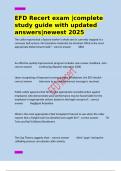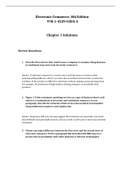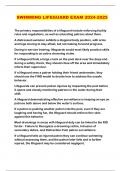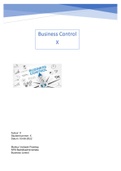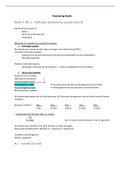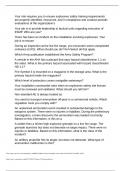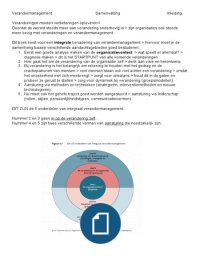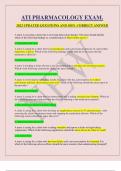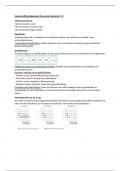1
NURS 501 Advanced Physiology and
Pathophysiology Updated 2024
Chapter 1: Cellular Biology Study Guide
1. Which statement best describes the cellular function of metabolic absorption?
a. Cells can produce proteins. c. Cells can take in and use nutrients. b. Cells can
secrete digestive enzymes. d. Cells can synthesize fats.
2. Most of a cell’s genetic information, including RNA and DNA, is contained in the:
a. Mitochondria c. Nucleolus b. Ribosome d. Lysosome
3. Which component of the cell produces hydrogen peroxide (H2 O2 ) by using oxygen to remove
hydrogen atoms from specific substrates in an oxidative
reaction? a. Lysosomes c. Ribosomes b. Peroxisomes d.
Oxyhydrosomes
4. Which cell component is capable of cellular autodigestion when it is released during cell injury?
a. Ribosome c. Smooth endoplasmic reticulum b. Golgi complex d.
Lysosomes
5. What is the sequence of steps in the development of a digestive enzyme by the pancreas cells
from the initial transcription to the release from the cell?
a. The enzyme is transcribed from DNA by RNA in the nucleus, proceeds to the
ribosome for synthesis, and is transported in a secretory vesicle to the cell
membrane.
b. The enzyme is transcribed from RNA by DNA in the nucleus, proceeds to the
lysosome for synthesis, and is transported in an encapsulated membrane to the
cell membrane.
c. The enzyme is transcribed by the mitochondria in the nucleus, proceeds to the
ribosome for synthesis, and is transported in a cytoskeleton to the cell membrane.
d. The enzyme is transcribed from DNA by RNA in the nucleus, proceeds to the
Golgi complex for synthesis, and is transported in cytosol to the cell membrane.
6. During which phase of the cell cycle is DNA synthesized?
a. G1 b. S c. G2 d. M
,2
7. What organic compound facilitates transportation across cell membranes by acting as receptors,
transport channels for electrolytes, and enzymes to drive active
,3
pumps? a. Lipids c. Proteins b. Proteases d. Carbohydrates
8. Understanding the various steps of proteolytic cascades, such as caspase-mediated apoptosis and
complement cascades, may be useful in designing drug therapy for which human diseases?
a. Cardiac and vascular disorders b. Autoimmune and malignant disorders c.
Gastrointestinal and renal disorders d. Endocrine and gastrointestinal disorders
9. Which structure prevents water-soluble molecules from entering cells across the plasma
membrane?
a. Carbohydrate chains.
b. Membrane channel proteins
c. Glycoprotein channels
d. Lipid bilayer (Phospholipids bi-layer)
10. The fluid mosaic model explains:
a. How a cell membrane functions b. Why our bodies appear to be solid c.
How tissue is differentiated d. How fluid moves between the intracellular and
extracellular compartments
11. Which form of cell communication is used to communicate within the cell itself and with other
cells in direct physical contact?
a. Protein channel (gap junction) b. Plasma membrane-bound signaling molecules
(involving receptors) c. Hormone secretion such as neurotransmitters d. Extracellular
chemical messengers such as ligands
12. Which mode of chemical signaling uses blood to transport communication to cells some distance
away?
a. Paracrine c. Neurotransmitter b. Autocrine d. Hormonal
13. Which mode of chemical signaling uses local chemical mediators that are quickly taken up,
destroyed, or immobilized?
a. Paracrine c. Neurotransmitter b. Autocrine d. Hormone
14. Neurotransmitters affect the postsynaptic membrane by binding to:
a. Lipids c. Amphipathic lipids b. Ribosomes d. Receptors
, 4
15. How do cells receive communication from the extracellular fluid surrounding them?
NURS 501 Advanced Physiology and
Pathophysiology Updated 2024
Chapter 1: Cellular Biology Study Guide
1. Which statement best describes the cellular function of metabolic absorption?
a. Cells can produce proteins. c. Cells can take in and use nutrients. b. Cells can
secrete digestive enzymes. d. Cells can synthesize fats.
2. Most of a cell’s genetic information, including RNA and DNA, is contained in the:
a. Mitochondria c. Nucleolus b. Ribosome d. Lysosome
3. Which component of the cell produces hydrogen peroxide (H2 O2 ) by using oxygen to remove
hydrogen atoms from specific substrates in an oxidative
reaction? a. Lysosomes c. Ribosomes b. Peroxisomes d.
Oxyhydrosomes
4. Which cell component is capable of cellular autodigestion when it is released during cell injury?
a. Ribosome c. Smooth endoplasmic reticulum b. Golgi complex d.
Lysosomes
5. What is the sequence of steps in the development of a digestive enzyme by the pancreas cells
from the initial transcription to the release from the cell?
a. The enzyme is transcribed from DNA by RNA in the nucleus, proceeds to the
ribosome for synthesis, and is transported in a secretory vesicle to the cell
membrane.
b. The enzyme is transcribed from RNA by DNA in the nucleus, proceeds to the
lysosome for synthesis, and is transported in an encapsulated membrane to the
cell membrane.
c. The enzyme is transcribed by the mitochondria in the nucleus, proceeds to the
ribosome for synthesis, and is transported in a cytoskeleton to the cell membrane.
d. The enzyme is transcribed from DNA by RNA in the nucleus, proceeds to the
Golgi complex for synthesis, and is transported in cytosol to the cell membrane.
6. During which phase of the cell cycle is DNA synthesized?
a. G1 b. S c. G2 d. M
,2
7. What organic compound facilitates transportation across cell membranes by acting as receptors,
transport channels for electrolytes, and enzymes to drive active
,3
pumps? a. Lipids c. Proteins b. Proteases d. Carbohydrates
8. Understanding the various steps of proteolytic cascades, such as caspase-mediated apoptosis and
complement cascades, may be useful in designing drug therapy for which human diseases?
a. Cardiac and vascular disorders b. Autoimmune and malignant disorders c.
Gastrointestinal and renal disorders d. Endocrine and gastrointestinal disorders
9. Which structure prevents water-soluble molecules from entering cells across the plasma
membrane?
a. Carbohydrate chains.
b. Membrane channel proteins
c. Glycoprotein channels
d. Lipid bilayer (Phospholipids bi-layer)
10. The fluid mosaic model explains:
a. How a cell membrane functions b. Why our bodies appear to be solid c.
How tissue is differentiated d. How fluid moves between the intracellular and
extracellular compartments
11. Which form of cell communication is used to communicate within the cell itself and with other
cells in direct physical contact?
a. Protein channel (gap junction) b. Plasma membrane-bound signaling molecules
(involving receptors) c. Hormone secretion such as neurotransmitters d. Extracellular
chemical messengers such as ligands
12. Which mode of chemical signaling uses blood to transport communication to cells some distance
away?
a. Paracrine c. Neurotransmitter b. Autocrine d. Hormonal
13. Which mode of chemical signaling uses local chemical mediators that are quickly taken up,
destroyed, or immobilized?
a. Paracrine c. Neurotransmitter b. Autocrine d. Hormone
14. Neurotransmitters affect the postsynaptic membrane by binding to:
a. Lipids c. Amphipathic lipids b. Ribosomes d. Receptors
, 4
15. How do cells receive communication from the extracellular fluid surrounding them?

